#loves his brother but its stated so much clearer in the manga
Explore tagged Tumblr posts
Text

why wasnt. this in the anime
#.text#trigun#knives worst brother ever award#i really do appreciate so much of what the anime did in terms of rearranging the timeline so we can learn about the characters#and the mystery around the story before it jumps into it like the manga did#but also as i read i just realize. they took away so much of knives just. in general. you can tell in the anime that he#loves his brother but its stated so much clearer in the manga#also the manga has such GOOD panels sometimes like genuinely.#sighs. trigun#made for me
28 notes
·
View notes
Text
Manga vs. Anime: My Next Life as a Villainess
I would like to be clear,I have greatly enjoyed the anime so far and find it to be very charming. Also, because we are only three episodes into the anime, I want to hold out on any strong opinions as of now.
That being said, the anime has felt rushed and hurried along in my opinion.
Which has been disappointing – as some of my favorite parts from the Manga didn’t receive as much attention, as I feel like they deserved.
I wouldn’t mind the hurried pace of the anime, if I felt like it lent itself more to the comedic timing. But so far, the Manga’s comedic timing has had more of a punch to it.
Though, to be fair, it’s only been three episodes and it’s very possible they’ve rushed through the childhood bits to focus on the harem’s time at the Magic Academy and when the Otome Game begins.
However, according to Wikipedia there are only 12 episodes.
So, the anime is presumably going to cover 15 Manga Chapters in the next 9 episodes. Which is certainly possible, especially since the first 7 chapters of the manga were depicted in 3 episodes.
Given, how I’ve felt about the first three episodes in comparison to the first 7 chapters, I am slightly concerned for the next 9 episodes.
I just feel like the manga explains the premise of certain scenes better than the anime has so far and adds more context to form a larger picture.
Particularly with Katarina’s rationale.
In the Manga, we get a far more depth look into why Katarina believes simply not bullying the heroine will not be enough.
As Katarina could be accused of being the ringleader of the bullies as she was the ringleader in the game. Or Geordo, who in the game is described as a ‘black-hearted prince’ might falsely accuse her of bullying, so he can be with the heroine.
We also get to see Katarina saying that she actually has difficulty imagining her Geordo exiling or killing her, but she quickly dismisses the reality of her situation; by believing that Geordo falling in love with the heroine will change him and he might soon view his current fiancée (her) as a nuisance to him.
Katarina is dense, don’t get me wrong – but her rationale does give credence to her reasoning and actions – if that makes sense.
So, I am disappointed with that.
Though, maybe, I’m just more than a bit salty that Katarina’s 15th Birthday Party didn’t get the attention I thought it deserved.
I think particularly in the dancing with the guys and even more specifically with Geordo.
Geordo and Katarina’s dance in the anime does make sense, but I think the manga really gave it a bit more depth…context…detail?
But, while I don’t think her birthday party deserves an entire episode by itself, it being squeezed in the last few minutes of the most recent episode, was not ideal.
That best describes it, I think. The anime feels like it’s trying to squeeze a lot in the last minute, so to speak.
However,
The manga is not without its own faults and the anime has added its own elements that have improved the story.
We are introduced to Katarina and get to see her and Geordo interact, before she regains her memories��
Keith’s backstory is elaborated on - He ended up hurting his brothers because he wanted to protect a bird and her babies from them.
Seeing Katarina break down Keith’s door from his perspective and seeing the light pouring into the room bit by bit, as the door and his loneliness crumble away, was sheer perfection
Geordo observing (from a distance) Katarina and Alan becoming friends and establishing, what I presume might be more jealousy between Geordo and Alan than the manga presented.
Geordo and Alan setting up their party and Geordo clearly being aware of Alan’s feelings before Alan is.
Geordo also stating that he has no intention of letting Katarina go as his fiancée.
Geordo saying that predicting what Katarina will do next is basically the one thing he’s not good at
Sophia being invited to the party and we get to see her clear concern and fear
Nicol’s route in the game is made a lot clearer than it was in manga
Nicol dealing with people insulting his sister (we do see this later in the manga, with a flashback).
Katarina gets a slight Ojou laugh when she leaves Keith and Mary to go to the bathroom (the manga did have Ho Ho Ho next to her in the very same scene)
The scene where Katarina jumps out of the tree, scaring away Sophia bullies is a lot clearer than it was in the manga
Sophia mentions a romance book between two women she read – that line alone adds more credence to the girls also falling for Katarina and it’s not just being "really good friendships”
Overall, more Alan and Nicol in the story. Or at the very least, more Alan.
The manga also has scenes and details that are not needed for the flow of the story, so those getting cut aren’t a problem.
I would much rather have an extra scene or two of the harem rather than learn Katarina has to take 5 maids with her to school, and so on.
But I also wanted more of Katarina’s Birthday Party Scene as well...so there’s that.
Basically, I just wish some of my favorite scenes in the manga were translated to the anime and given the attention, I feel like they deserved.
But I am curious, if those who have only really seen the anime feel like the pacing is rushed.
Because, honestly the fact that one gets to set their own pace when reading a manga might be the sole cause for my issues with the pacing.
And that’s true of any written work being translated onto screen. What my mind focuses on, might not be the intention of the author or might not be interpreted by others in the same way.
For instance, I’ve personally read the end of chapter 7 with a twinge of sadness to it.


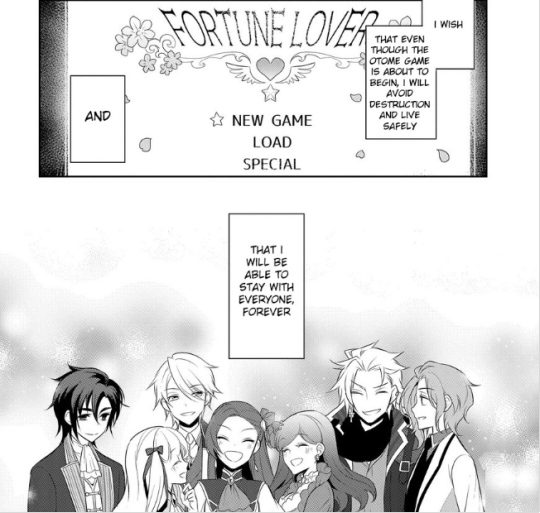
Because, as much as Katarina has been preparing herself for the game’s potential endings, I don’t think she will ever be prepared for the heartbreak she’ll experience, if they were to come true.
Again, that’s just how I read it.
I may have also thought that an animated version of Chapter 7′s ending could’ve been an easy improvement upon what we got from the Manga. Basically, what I just presented to you above (as I omitted several panels from the Manga).
But we’re way off topic now.
Obviously, this isn’t a new problem for manga readers – I just haven’t read all that much Manga in comparison to all the anime I’ve watched. And in some cases of Manga vs Anime, I’ve personally felt the anime improved upon it or they were evenly matched.
So, I guess, since fell in love with manga instantly more so than I did with the first episode, I just want the anime to bring its all to this story.
I also hope the anime can slow down in its pacing, now that we’ve gotten to the main story.
#Katarina Claes#my next life as a villainess#Otome game no hametsu flag#Catarina Claes#Hamefura#Geordo Stuart#Alan Stuart#Keith Claes#Nicol Ascart#Sophia Ascart#Mary Hunt#destruction flag otome
326 notes
·
View notes
Text
The Three Faces of Furuya Rei, or: what moral philosophy does Furuya Rei subscribe to?
Furuya Rei is a fascinating character that can be difficult to understand. This is complicated by the fact that he presents three very different faces to us. Our very first impression of him was as the kindly waiter and detective, Amuro Tooru; next we are shown the antagonist, Bourbon, and last, we discover the driving force behind them: the undercover agent, Furuya Rei. These three personas act in a very different way, especially Bourbon, making Rei’s true motives and morality somewhat opaque to us. In this meta I will analyze Rei’s actions and motives in order to discern the true school of morality that he believes in.
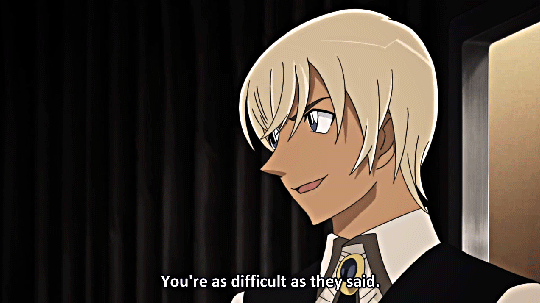
There are three major theories of morality; virtue ethics, utilitarianism, and deontology. However, in this meta I will be brush on ethical egoism as well. Let us first talk about the relevant theories.
Virtue Ethics is first and foremost concerned with character. Here, we judge right and wrong based on whether or not it is virtuous. A person’s action reflects on their character; a virtuous person will do virtuous actions, and vice versa. Therefore, virtue ethics defines virtuous actions as the right action.
Utilitarianism, on the other hand, defines right and wrong based on the consequence of the action. It is concerned with outcomes; in utilitarianism, the end justifies the means. As long as the action results in the greatest good for the greatest number of people, it is right.
Lastly, Deontology defines right and wrong based on what the duty of the subject is. It is concerned with motives; as long as the person was trying to fulfill their duty, then it is right according to deontology. What the duty itself is, of course, subject to argument.
Now out of these three moral theories, which one does Furuya Rei follow?
To analyze this, I will be including materials from the Zero the Enforcer movie as well. This is because in my opinion, we don't actually get much insight into Rei's motives in the manga; we are told what he wants, but we’re not really told why, at least not enough to explain how he justifies his actions for himself. Now let’s get to the analysis itself.

First things first, I think we can safely say that Furuya Rei doesn’t subscribe to virtue ethics. In his debut as Amuro Tooru, in the private eye case, we see him allow Banba, a murder suspect, to destroy exonerating evidence. We also see him create a wrong deduction that almost damned an innocent man. With what we know of his deductive capabilities, as well as the fact that he had all pieces of the evidence and knowledge required to solve the case from the beginning, it is highly implied that he deliberately risked Banba’s freedom just to test Kogoro. Hardly the actions of a virtuous man. It should be noted, however, that in this case, Rei had still maintained control of the situation, thereby allowing him to keep the worst-case scenario from happening; as a PSB member, he would still be capable of exonerating Banba later.
I deliberately did not mention the Detectives’ Nocturne case, the Mystery Train case, as well as the Elementary Teacher Assault case, as I don’t believe that the evidence presented in these cases can conclusively point to Rei’s true intentions. There are always possible alternative interpretations that makes his actions possibly virtuous. However, I will mention the Zero the Enforcer movie. This movie clearly lays out that Rei is definitely not a nice person, and doesn’t mind that other people knows that about him. He deliberately framed Kogoro as a terrorism suspect; fabricated evidence, bugged Conan’s phone, and was generally manipulative. Thus, from the evidence, we can conclusively say that neither manga!Rei nor movie!Rei follow the school of Virtue Ethics.
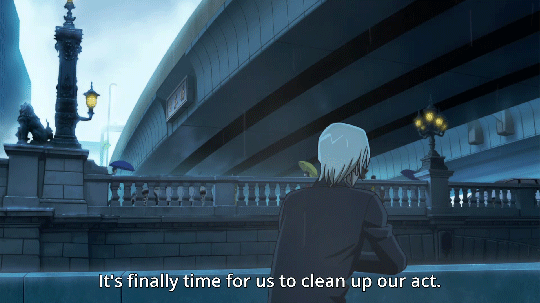
The second school of ethics we will analyze is utilitarianism. In utilitarianism, the end justifies the means. For Furuya Rei, ‘the end’ would probably be the downfall of the Black Organization, or, taking it further, the safety of Japan and its citizens. I have seen some people take the point of view that Rei had wanted to kill Sherry in the Mystery Train, so that she wouldn’t produce more works that could be used to harm innocents; if this is true, then he would definitely be an utilitarian. However, I’ve argued before that Rei had not intended to kill Shiho and instead had wanted to spirit her to safety, as she is a valuable lead into Elena Miyano’s whereabouts. Therefore, the Mystery Train case should not be taken as evidence that Rei is an utilitarian.
As there is no evidence that Rei is an utilitarian, one way or another, one could argue that we could take Rei’s willingness to do morally-questionable things as evidence that he thinks it will lead to a better outcome for everyone, if not for one notable case: Akai Shuuichi.
In my opinion, utilitarianism is a very rational and cold moral philosophy; it is a moral school perfectly suited to geniuses, masterminds, and detectives like Rei. However, when it comes to Akai Shuuichi, we see Rei display zero reason. There is no obvious rationale why taking Akai out of the game would result in a better outcome for all, and Rei doesn’t even attempt to explain it; nonetheless, he continues to hunt Akai without any sense of guilt, which implies that he thinks hunting Akai is the correct course of action (note that I don’t necessarily think that Rei wants to kill Akai, despite what he said--more on that later). This implies that Furuya Rei does not necessarily believe in utilitarianism.
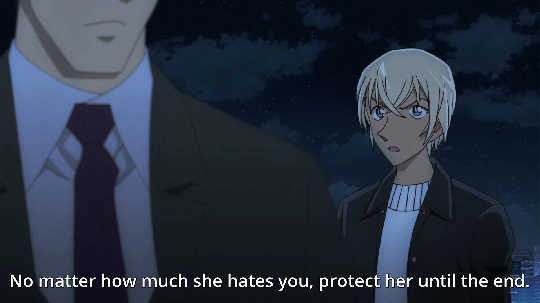
This brings us to the last major ethical theory: Deontology. Deontology is concerned with duty; it takes motive into account more than the actions itself. And Rei has so kindly told us which duty he has dedicated himself to in the Elementary School Assault case.
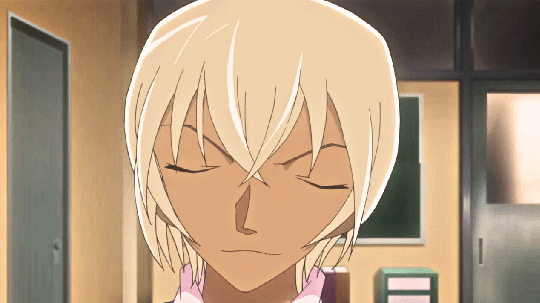
That’s correct; he’s dedicated himself to his lovely, lovely Japan. Conan said it best:
“I was sure that since he said that to the FBI investigators... those beliefs!”
It becomes even clearer if you look at the Zero the Enforcer movie. There, Rei clearly states what he thought of his job to Kazami.

In other words, our job isn’t always nice or even legal, but we have to finish it because it’s our duty.
If we take the point of view that Rei subscribes to deontology, a lot of his action becomes immediately explainable. He cuts contact with his old friends all to make sure they were safe, but he risks returning Hiromitsu’s cellphone to his older brother because he feels that it’s his duty as Hiromitsu’s friend. Arguably, he hunts Akai Shuuichi out of duty to his fallen friend, and yes, to his country. Akai, after all, was not only involved in Scotch’s death; he’s also operating illegally in Rei’s territory. This would explain why Rei brings PSB agents instead BO agents into the Scarlet Showdown; if Rei intended to kill Akai one way or another, bringing BO agents is definitely the way to do it. This is because bringing PSB means Akai would fall into PSB custody, and there Rei cannot do whatever he likes with Akai; he must answer to his superiors in the PSB. I believe that despite what Akai said, here Rei had only intended to arrest Akai.
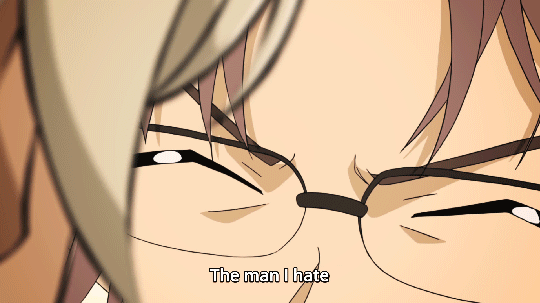
So why, then, did he say that he wished to kill Akai, right in front of Okiya Subaru’s face? This brings us to my last theory: it’s because to figure out how to act, Rei aligns each of his three faces to a different moral theory.
Amuro Tooru, quite obviously, follows virtue ethics. He is polite, kind, always helpful, always cheerful. He does not do morally questionable things; he is an upstanding member of society.
Furuya Rei, as we’ve discussed, is a deontologist. He is dutiful to his friends and country but now he has no friends left so really it’s just his country. His ‘lover’ is Japan itself, and he is willing to do anything--anything--to keep her safe.
And Bourbon? Bourbon would probably loosely follow ethical egoism. It is out of the question for Rei to create an absolutely amoral persona for Bourbon--it would unnecessarily conflict with his deontologist morality. However, to fit in the Black Organization, he needs to create someone who would do terrible things without needing to justify it with ‘duty’ or ‘the greater good’. Someone who wouldn’t just do anything that’s asked of him too, so Rei could reasonably rein Bourbon in. Rei would probably style Bourbon as someone who looks out for his own interests, and only his own, whatever that may be.
And so when Rei wants to hunt down Shuuichi Akai, Bourbon would say that it’s because in his interest to do so--because he bears a grudge against Akai, perhaps, and as an organization member, murdering Akai is the only way to resolve it. Bourbon would investigate Okiya Subaru and corner him, but Rei wouldn’t bring the Organization into their confrontation. Bourbon would threaten Okiya Subaru with death--but Rei wouldn’t pull Okiya’s collar down and condemn him right then and there. Because at the end of the day, the one holding the wheels is Rei, not Bourbon, and whatever he may say, Furuya Rei is a dutiful police officer, and he believes in justice.

#dcmk#detective conan#meta#dcmk meta#amuro tooru#tooru amuro#furuya rei#rei furuya#bourbon#yes i made this meta because i can't justify furuya wanting to kill akai#because for some reason he brings psb agents to the scarlet showdown#he also never exposed okiya subaru when he really should have#which leads to this long spiel about morality where i sort out my thoughts about furuya#i need to sort out my priorities
170 notes
·
View notes